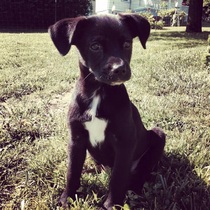 By Paula Garber, AVA As a Puppy Parent you have taken on a very rewarding job. You have the opportunity to guide your puppy into becoming a confident and loved member of your family. The past and most common theory has been that you must be the "Alpha" dog of your "dog pack." This outdated theory usually entails dominating your puppy both physically and mentally. It is theorized that you need to dominate your puppy at all times and be prepared to stop any challenge that your puppy may make toward your "alpha" role. It is assumed, by this theory, that your puppy is constantly thinking of ways to stage a coup and take over leadership. We have since realized that the "alpha theory" is incorrect and that there is a much simpler explanation for why your dog misbehaves--he has not been taught the correct behavior. Although "pack rules" apply to the relationship between dogs, they do not apply to a person. Your puppy knows you are not a dog. The dominance theory is simply unnecessary and may prevent you from enjoying the broad relationship you can have with your puppy. Now that we have disposed of the idea that your puppy is constantly trying to take over the human world, we can begin to build a positive relationship between you and your puppy. Be Fair The following are 10 things that we know about dogs (edited from Culture Clash by Jean Donaldson):
Part of being fair is understanding the previously mentioned dog characteristics. We ask our dogs to live in a human world, follow human rules and give up many of their normal dog behaviors. We should be fair in our expectations and understand what motivates our dogs. Being a Good Teacher Being a good teacher is not about domination or forcing your will on others. It is about taking responsibility, not only for making decisions but also for taking care of your "students." As a teacher it is your job to sort out things when they go wrong. Imagine that you are on an airplane and you discover tha the pilot has never flown a plane before. Things begin to go wrong, the plane dips, warning lights go on and your pilot is hiding in the restroom. You lose confidence and begin to look for a new person to guide you out of the unpredictable situation. You need to show your puppy that he can have confidence in you and that you will take care of things--especially when things go wrong. A teacher should give consistent guidance and not provide fear. Your job is to guide your puppy into making the right decisions by controlling what he learns. A fundamental method of doing this is through supervision. Don't allow your puppy to learn that grabbing your child's clothes will make the child dance around squealing with what the puppy thinks is delight. Instead, teach your puppy to sit at the child's feet for a food treat. We spend an enormous amount of time telling our puppies "No, no, bad dog" but we don't guide them into making a decision that will be rewarded. Don't waste your time telling your puppy what not to do. Instead teach him what to do. Be Consistent Lack of consistency and predictability are two of the main precursors for behavior problems. Imagine that one day you went to work and your boss told you what a wonderful employee that you were. Five minutes later he was ranting and screaming at you for no apparent reason. Later, he tells you how much he values you. This environment would create anxiety and distrust. Many times this is the very environment we create for our dogs. They cannot predict how we will react. Be a Good Communicator Your job is to tell your puppy when he is doing something that you like by rewarding the behavior. A behavior will be reapeated if it is rewarded. If a behavior is not rewarded, it will go away. You have less than one second to communicate to your puppy that a behavior is correct. There will rarely, if ever, be a time that you need to discipline your puppy. You should never have to "enforce" obedience, it will be given willingly when your puppy trusts and respects you. Trust and respect will come from your consistent and predictable interactions, ability to communicate accurately which behaviors will be rewarded and the ability to teach the behaviors you want your puppy to learn. If your puppy is performing a behavior that could hurt himself or others, stop the behavior and get your puppy out of the situation before he learns something that you don't want him to learn. Sit down and decide what behavior you should teach to prevent the behavior from occurring again. Don't physically discipline him--which will only increase aggression and fear. Instead, guide him into a more appropriate behavior that you can reward. You and your puppy are a team. His job is to offer behaviors and your job is to pick behaviors to be rewarded. Only when you understand how your puppy thinks and learns will you gain his trust and respect. This information has been given as a brief overview of how to be a good Puppy Parent. However, many of us have not used these methods before and we need to retrain ourselves before attempting to communicate with our puppies. Please let us know if you have any questions or need additional instruction in applying behavior-based training methods. References and Suggested Reading: 1. Culture Clash, Jean Donaldson 2. Don't Shoot the Dogs: The New Art of Teaching and Training 3. Clicking with your Dogs, Peggy Tillman 4. The Perfect Puppy: How to Raise a Well-Behaved Dog, B. Bailey 5. Pupply Training for Kids, S. Whitehead Visit www.dogwise.com for availability of the above titles.
1 Comment
Your comment will be posted after it is approved.
Leave a Reply. |
 RSS Feed
RSS Feed